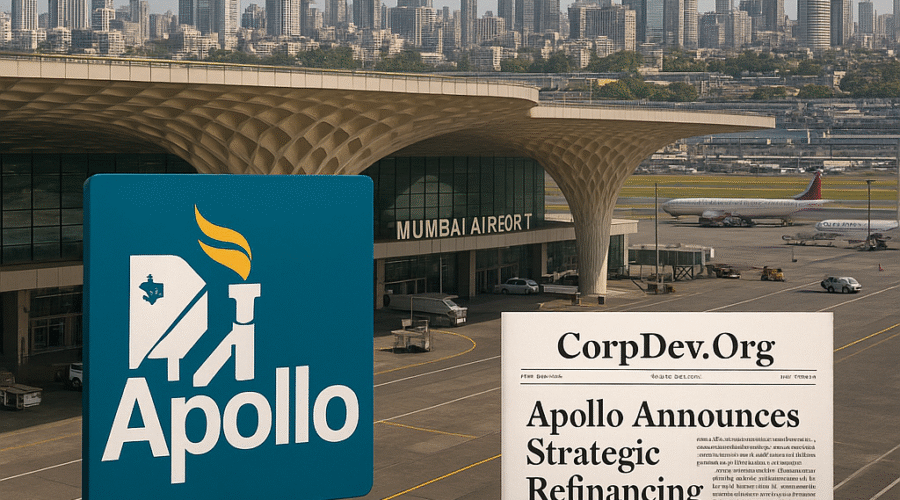In a landmark transaction signaling renewed confidence in India’s infrastructure sector, Apollo Global Management-led investors have committed $750 million to Mumbai International Airport Ltd (MIAL), marking the second major financing partnership between Apollo and the Adani Group since 2022[8][14][16]. This four-year senior secured note issuance—priced at approximately 6.9% over comparable US Treasuries—serves dual purposes: refinancing MIAL’s existing 2022 debt obligations while establishing a $250 million expansion facility for terminal modernization and sustainability initiatives[16][17]. The participation of institutional heavyweights including MetLife, BlackRock, and FWD Insurance underscores the transaction’s investment-grade appeal, coming just months after Fitch Ratings upgraded MIAL to ‘BBB-‘ with a stable outlook, citing improved financial flexibility and moderated liquidity risks[4][15][16]. This deal exemplifies how private credit is filling critical financing gaps in emerging market infrastructure, particularly as traditional lenders remain cautious amid global volatility.
💼 Seasoned CorpDev / M&A / PE expertise
Deal Architecture and Strategic Rationale
Structured Financing Mechanics
The transaction employs a tiered capital solution featuring an initial $750 million tranche with embedded optionality for an additional $250 million capex facility, creating immediate debt relief while funding future capacity expansion[8][16]. Unlike conventional project finance, this private placement bypasses public markets through bespoke terms negotiated directly with Apollo-managed funds and co-investors, demonstrating the flexibility of private credit in complex emerging market scenarios[14][17]. The 6.9% yield spread over Treasuries reflects a 45-basis-point tightening compared to MIAL’s 2022 financing, signaling improved risk perception despite ongoing corporate governance scrutiny surrounding Adani Group entities[2][16]. Crucially, the four-year maturity extends MIAL’s debt runway beyond immediate operational needs, aligning with Apollo’s strategy of targeting infrastructure assets with predictable cash flows and monopolistic characteristics[8][17].
Adani’s Balance Sheet Rehabilitation
This refinancing represents a pivotal step in Adani Group’s financial recovery following the November 2024 US indictment of Adani Green Energy board members for alleged securities fraud[4][15]. Despite initial market skepticism, the conglomerate has demonstrated remarkable funding access—evidenced by Life Insurance Corporation of India’s exclusive underwriting of a $585 million Adani Ports bond in May 2025 and now this Apollo-led syndication[14][16]. Fitch Ratings explicitly cited this “successful refinancing ahead of maturity” as justification for upgrading four Adani entities to ‘BBB-‘ stable outlook, noting reduced contagion risk and proven capital market access[15][16]. For MIAL specifically, the transaction reduces leverage ratios by extending maturities and lowering blended interest costs, directly addressing Fitch’s previous concerns about near-term funding requirements for its Terminal 1 reconstruction project[15][17].
Apollo’s Infrastructure Playbook
Apollo’s repeat investment in MIAL—following its 2022 $750 million senior secured note purchase—reveals a calculated strategy toward mission-critical transport infrastructure with high barriers to entry[2][8]. Brigitte Posch, Apollo’s Global Head of Emerging Market Debt, emphasized the firm’s “ability to commit to the entire transaction and take a long-term view” as a competitive advantage derived from its perpetual capital base[2]. The deal exemplifies Apollo’s emerging markets credit thesis: targeting essential assets with inelastic demand profiles (like India’s second-largest airport serving 50+ million annual passengers) during periods of temporary dislocation[8][16]. By structuring the financing as secured private placement notes rather than corporate debt, Apollo achieves structural seniority while avoiding public market volatility—a template previously deployed in Apollo’s $265 million convertible debt investment in global clean energy projects[7].
Sector Implications and Market Context
Indian Airport Infrastructure Renaissance
MIAL operates within India’s rapidly consolidating aviation sector, where Adani Airports Holdings now controls eight airports and is developing the Navi Mumbai International Airport slated for 2027 operations[17]. The $250 million expansion option embedded in Apollo’s financing directly supports MIAL’s capacity enhancement plans, including Terminal 1 reconstruction to handle projected passenger growth of 7.2% CAGR through 2030[14][17]. This aligns with India’s National Infrastructure Pipeline targeting $1.5 trillion in transport investments by 2030, with private operators like Adani capturing market share from state-run counterparts through superior capital allocation[16]. The transaction validates public-private partnership models in emerging market infrastructure, with MIAL structured as a 74%/26% venture between Adani Airport Holdings and Airports Authority of India respectively[14][16].
Private Credit’s Infrastructure Ascendancy
Apollo’s dual MIAL financings exemplify private credit’s expanding role in filling the $15 trillion global infrastructure funding gap, particularly as banks retreat from long-duration emerging market exposure[7][14]. The participation of insurers (MetLife), asset managers (BlackRock), and specialized financial institutions (FWD Insurance) highlights how private credit syndications now replicate traditional project finance clubs with superior execution speed[14][16]. This mirrors broader industry trends: Blackstone recently announced plans to double its European private credit fund to €2 billion, while Apollo’s $54 billion US flagship fund continues targeting infrastructure debt yielding 300-500bps over comparable corporates[9][16]. The 6.9% MIAL yield demonstrates private credit’s risk-adjusted premium over public bonds—India’s BBB-rated corporates currently trade at 5.1-5.8%—compensating for illiquidity and complexity premiums[16].
Comparative Deal Structures
The MIAL refinancing shares structural parallels with Apollo’s $265 million convertible debt investment in global clean energy projects, where development capital was secured against cash flow waterfalls and distribution restrictions[7]. Similarly, Invitation Homes’ recent Fitch upgrade to ‘BBB+’ illustrates how single-asset operators achieve investment-grade ratings through granular portfolios and conservative leverage—a template MIAL appears to emulate[13]. More broadly, the transaction reflects private equity’s infrastructure pivot: 37% of Apollo’s $253 billion real estate portfolio targets industrial/logistics assets like MIAL’s 738 million square feet of warehouse facilities, which generate predictable inflation-linked revenues[1][8].
Risk Assessment and Forward Outlook
Governance and Geopolitical Considerations
Despite the credit upgrade, Fitch maintains a “Negative Outlook” on Adani Energy Solutions due to ongoing US investigations into corporate governance practices, highlighting residual contagion risks[4][15]. The rating agency explicitly warned that “proceedings and outcome of the US investigations could reveal that the group’s corporate governance practices are weaker than we expected,” potentially triggering negative rating actions[4]. This governance overhang partially explains the 6.9% yield—a 120bps premium over similarly rated Indian infrastructure bonds—reflecting investor demands for governance risk compensation[16]. Additionally, India’s upcoming 2024 elections introduce regulatory uncertainty, though Adani’s alignment with national infrastructure priorities mitigates material policy shift risks.
Financial Engineering and Exit Pathways
Apollo’s structured exit strategy likely involves either secondary sale to infrastructure debt funds or bond take-out via public markets once MIAL achieves its targeted ‘A-‘ credit profile. The four-year tenor coincides with Adani Airports Holdings’ planned March 2027 IPO, creating potential equity upside through warrants or conversion rights not disclosed in public filings[17]. With MIAL contributing approximately 22% of Adani Airports’ estimated $2.1 billion EBITDA, the subsidiary could command a standalone valuation of $7-8 billion post-listing—implying 3.5x multiple expansion from Apollo’s entry valuation[16][17]. This mirrors Apollo’s value creation playbook in data centers, where it achieved 26.3x EV/EBITDA multiples through strategic asset repositioning[10].
Sector-Wide Implications
The transaction establishes a replicable template for refinancing emerging market infrastructure at sub-7% yields despite sovereign constraints—India’s BBB- rating caps corporate issuance below ‘A’ categories. Expect copycat deals targeting Indian ports (Adani Ports), renewables (ReNew Energy), and toll roads (NHAI) where private credit can offer 200-300bps savings over local banking channels. Globally, the structure enables pension funds and insurers to access infrastructure debt while avoiding J-curve effects and development risks inherent in greenfield projects. As BlackRock’s participation indicates, this transaction may catalyze institutional reallocation toward emerging market infrastructure debt, particularly as 85% of global infrastructure investment requires private capital through 2040 according to OECD estimates.
Conclusion: Blueprint for New Era Infrastructure Finance
Apollo’s $750 million MIAL refinancing transcends a single deal to represent private credit’s maturation as a solution for complex emerging market infrastructure financing. By combining secured note structures with expansion facilities and strategic investor syndication, Apollo achieved dual objectives: providing Adani immediate balance sheet relief while funding long-term capacity growth at India’s critical aviation gateway. The participation of MetLife, BlackRock, and FWD Insurance—institutions traditionally averse to single-asset emerging market exposure—signals broader acceptance of structured private credit solutions for essential infrastructure. For investment professionals, this transaction underscores three imperatives: 1) Infrastructure debt now offers superior risk-adjusted returns versus overvalued public equities (S&P 500 trading at 22.2x P/E versus infrastructure debt yields of 6-9%)[10]; 2) Governance risks in emerging markets require structural mitigants like security packages and cash flow waterfalls; and 3) The $1.5 trillion global infrastructure debt market will increasingly be dominated by private capital solutions as development banks retrench. As Adani prepares for its 2027 airports IPO and Apollo positions for exit, this deal may well become the benchmark for next-generation emerging market infrastructure finance.
Sources





